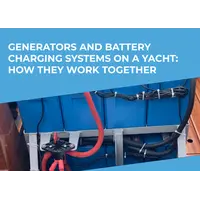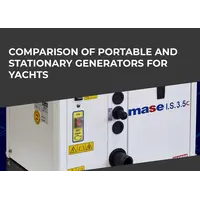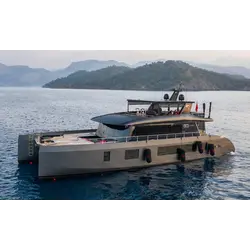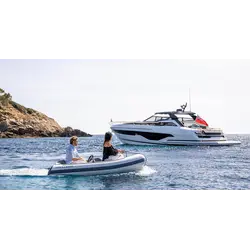In this article, topRik experts find out when a yacht owner needs a backup generator. We will give recommendations on what criteria to use to select one, and also discuss what type of generator is more suitable as a backup power source on a vessel. Our experts, who have participated in long-distance passages, will advise what criteria to follow when choosing an emergency generator.
Don’t forget that at the topRik marketplace you can buy a backup generator of the required power from the best manufacturers of marine electrical equipment.
Situations When a Backup Generator May Be Needed
Let's answer one of the questions in the title right away: we believe that for long-distance sailing a backup generator is essential equipment for your yacht.
Moreover, this should be a unit that does not depend on the availability of shore power, wind strength, sunlight and the speed that the yacht can develop at the moment. That is, we are talking about an emergency or any other situation in which power from the main source is unavailable. It is not by chance that backup generators are also called emergency generators. They should replace a failed engine generator (alternator), from which the batteries are charged on most boats. And a standard alternator installed on the engine can fail quite quickly in salty, humid air.
A yacht must have a backup battery that will provide communication with security and rescue services at sea. But it is even more reliable if you have a backup generator that can charge any battery if the backup fails.
Wind generators, solar panels or hydro generators are not suitable for this purpose, since they depend on natural phenomena - wind force and sunlight intensity.
There are sailors among us who used to install an additional backup alternator, but with the advent of modern marine generators, the need to “strain” the yacht’s engine has disappeared.
Of course, if you are going on short coastal cruises from port to port, you can get by with an alternator, solar panels and a backup battery with regular recharging from shore power. But if it is a transatlantic crossing or a long voyage in regions with insufficiently developed coastal infrastructure, you cannot do without a backup generator.
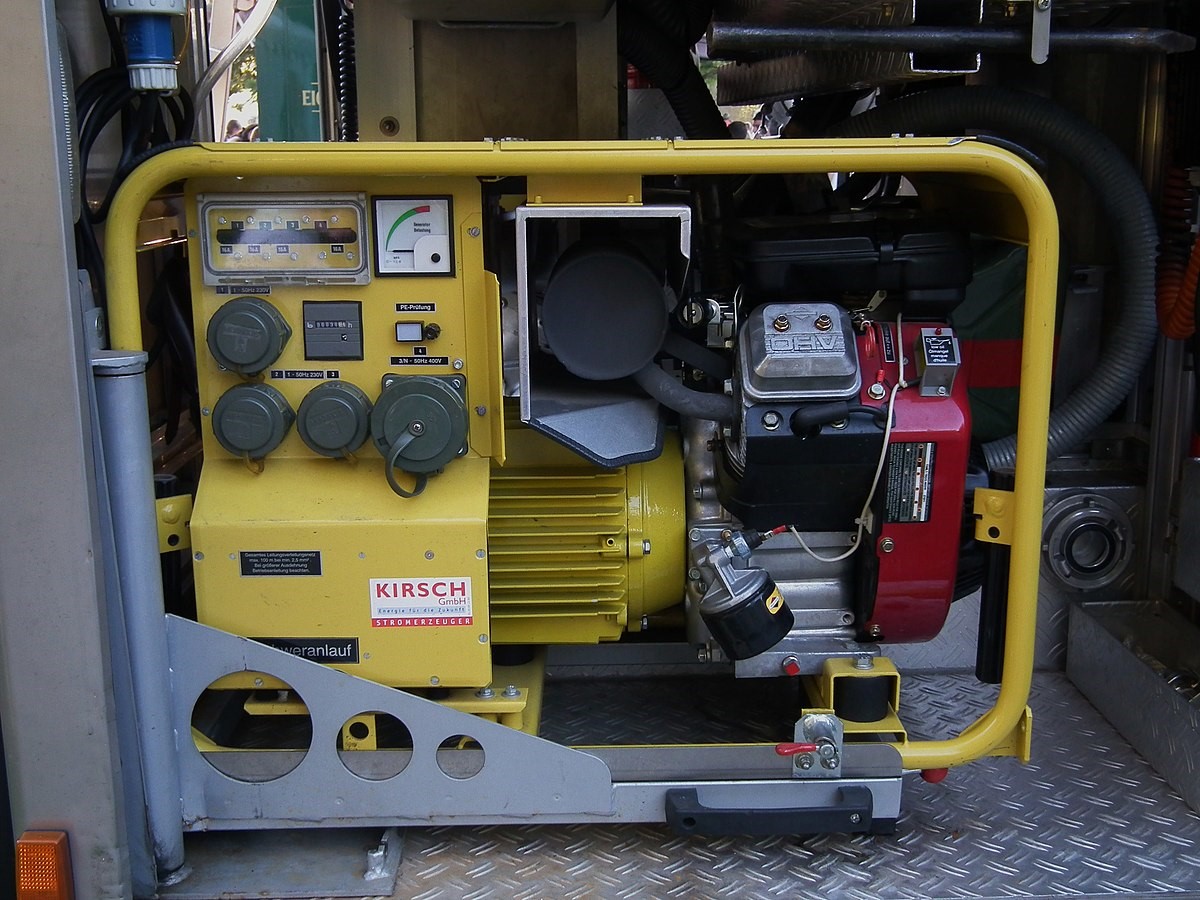
Why Do You Need Backup Generators on a Yacht?
Safety requirements and regulations of many countries require the mandatory presence of an emergency power supply on the ship. This can be a battery or a diesel generator, where the combustion chambers convert thermal energy into mechanical and then electrical energy.
Their assistance must be sufficient to operate all equipment necessary to ensure safe navigation in an emergency. For ships carrying passengers, such requirements include the need to ensure the following working systems for a certain period of time:
- emergency lighting on a ship;
- signal lights;
- sound signaling devices;
- communication equipment inside the ship;
- communication with other ships and the shore;
- navigation equipment;
- fire detection system;
- one of the fire pumps for use if necessary;
- steering gear drive equipment;
- equipment for operating a foam generator.
The operating time (and therefore the power) of the backup generator must be sufficient to ensure the resolution of the maximum number of emergency situations on the vessel, to wait for help, to evacuate passengers and crew if necessary. Additionally, the generator must ensure the operation of the lighting system for boarding boats and other rescue equipment.
Types of Backup Generators for Yachts
According to the requirements for the heavy-duty fleet, the emergency marine ship generator is a typical dynamo with combustion chambers, where the thermal energy is alternately converted into mechanical energy of the rotating shaft into an alternating magnetic field. At the same time, marine models have the property of a minimum level of residual magnetic field after stopping. This allows for a faster supply of sufficient voltage to the network during a restart and a quick return to the nominal operating mode.
For yachts and boats where there is no need to produce high power, it is possible to use brushless marine generators in a casing or even batteries. The first solution will not allow you to directly regulate the output current value, but such equipment has a number of advantages. We are talking about ease of maintenance, overall high reliability, which is important for emergency diesel installations.
In principle, such marine emergency diesel generators do not differ from the main engine except for a relatively small output power. Usually it is 100 kW (there may be other parameters if the sea vessels are small and have a lower level of constant energy consumption), which is enough to power the critical systems of the ship. At the same time, the following characteristics are relevant for such a diesel engine:
- ease of starting and controlling ship power plants to provide power in the shortest possible time;
- ease of maintenance, which is important for vessels that spend most of their time at sea (it is important that maintenance and most types of repairs can be carried out directly on the yacht outside the port);
- the ability to operate effectively outside of control electronics and structural simplicity, which increases overall reliability, simplifies distribution systems and improves safety;
- the ability to operate stably at high temperatures due to the relatively small space and large volume of heat generated in the combustion chambers;
- normal operation of the diesel generator when the vessel is listing.
Based on these requirements, the size and configuration of your yacht, and the sailing route, select the appropriate type of backup generator.
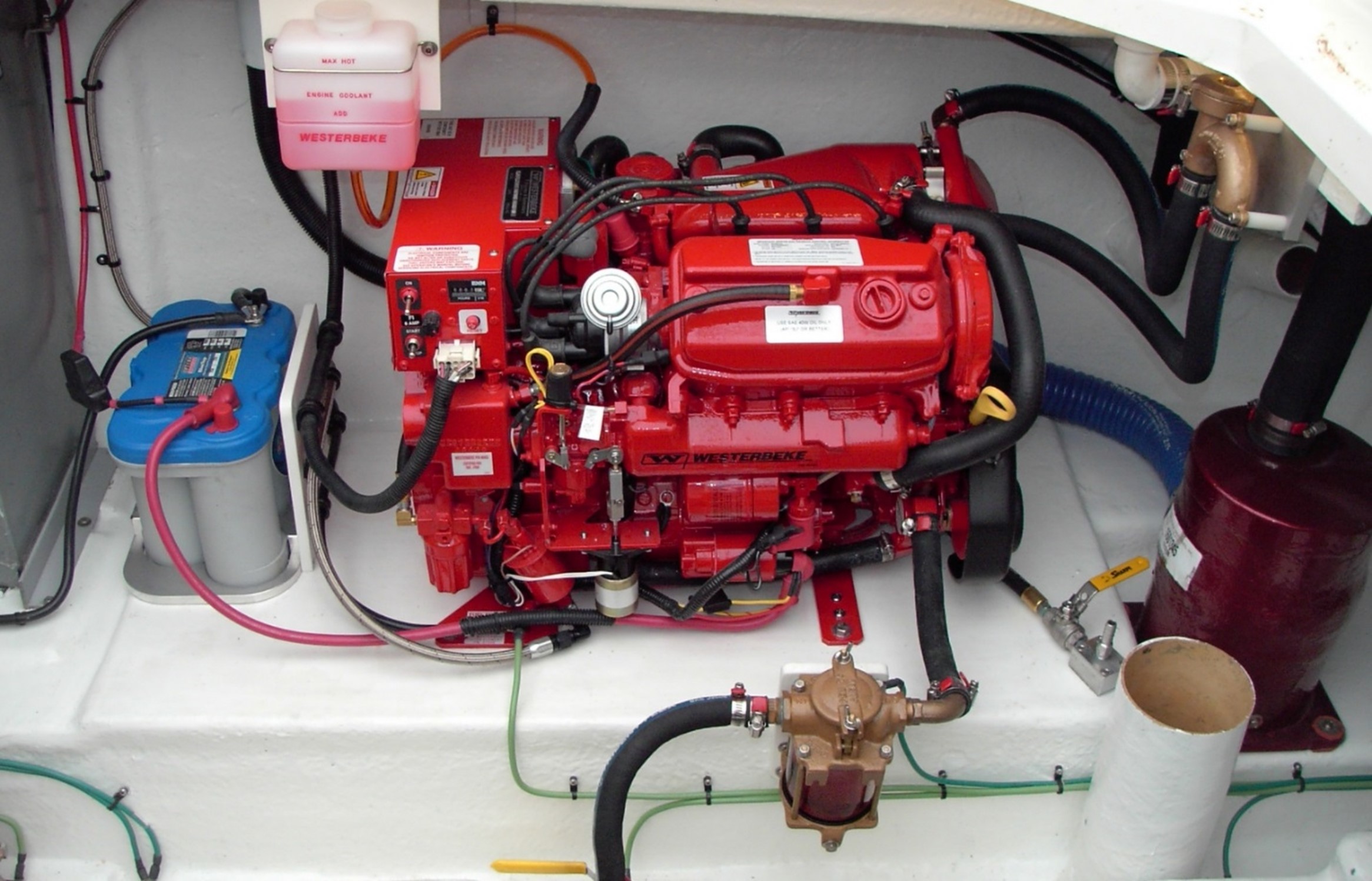
Stationary or Portable
Here, everything depends on the required power – that is, on the equipment that will be connected to the generator in the event of engine failure and, accordingly, the alternator. Stationary models have significantly more power than portable ones.
Let's immediately determine that for a long voyage, a gasoline portable generator is absolutely not suitable as a backup. Of course, you can have it on board if space allows, but only as an additional power source for a certain device that will work for a short time, for example, a drill or similar equipment.
Hybrid Generators
These are generators that combine different similar characteristics, such as models that run on both diesel fuel and gasoline, or gasoline and gas. Given that gasoline and gas are more flammable substances, it is better not to use them on a boat.
In addition, the corresponding generator uses diesel fuel much more economically than gasoline models.
For large cargo and passenger ships and ferries, hybrid marine power plants with three operating modes are produced:
- powered by batteries;
- parallel operation of diesel generators and storage batteries;
- power supply from diesel generators and battery charging.
Inverter Generator
An inverter generator is a backup power source used to support the operation of high-precision electronic equipment. Their main feature is a built-in digital unit that allows you to get a stable current with ideal characteristics at the output.
Among the advantages of inverter generators:
- dimensions – almost 2 times smaller than usual;
- high level of efficiency due to automatic regulation of engine speed – the power they produce depends on the load at a particular moment: if it is small, the unit will automatically switch to an economical operating mode;
- double noise-insulating casing or special muffler guarantee low noise levels, even when operating at maximum speed;
- the stable current obtained with the help of the installation has highly precise characteristics – the distortion of the sine wave at full load is no more than 2.5%;
- emit much less harmful substances into the environment than conventional diesel and petrol units due to an improved fuel combustion system.
At the same time, the maximum continuous operation time of an inverter generator is only 3-6 hours (this figure depends on the specific model). If the operating time exceeds this limit, it will significantly reduce the equipment's service life or lead to its breakdown. Therefore, it is recommended to use the generator for no more than 5 hours to avoid reducing the service life. As you can see, an inverter generator is also not suitable as a backup in conditions of long-term autonomous sailing, and they are usually low-power. But as an additional source of energy in conditions of a coastal cruise, it is quite effective.
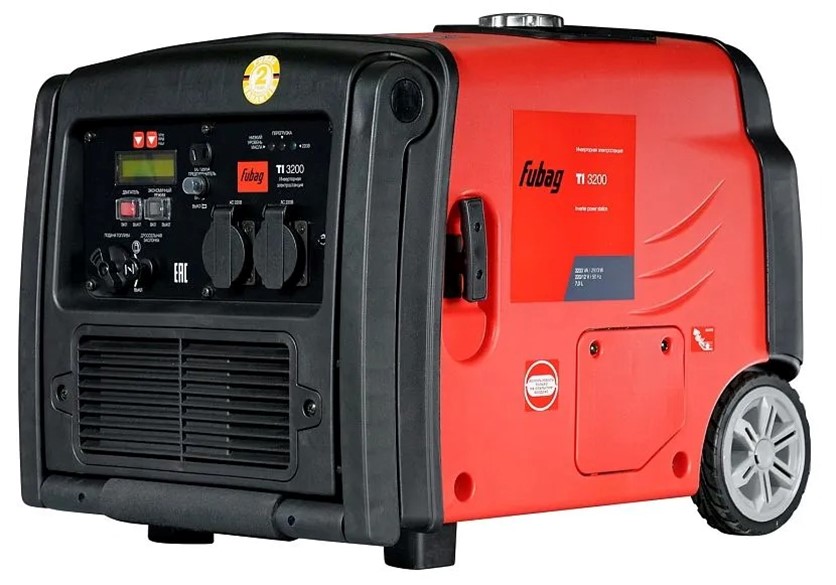
Key Criteria for Selecting a Backup Generator
To choose the right backup generator for your yacht, it is enough to carefully study the main characteristics of the model and be well aware of the dimensions and electrical circuit of the boat on which you plan to install this alternative power source.
Power
This is the main feature to look for when purchasing a backup generator.
The total power of the devices connected to the generator should not exceed the power it produces. Ideally, the load of consumers is 20% less than the maximum value for the generator.
It is also necessary to take into account the starting currents of electrical devices. At the moment of starting, most devices consume 6 times more energy than in standard operating mode.
To avoid making a mistake with the generator power, you should:
- identify each consumer of electricity on board;
- determine the capacity of each consumer;
- perform calculations – multiply the nominal power by the starting current coefficient and sum the results for all consumers;
- add 10% to the resulting amount in case of wear and tear or the addition of additional consumers.
Fuel Type
Here you will have to choose between two options - diesel and petrol, unless you count the petrol-gas hybrid models, which are not suitable for a backup generator and are generally not desirable on a boat.
However, gasoline is flammable and explosive, which is critical on a yacht where there is a kitchen and where a fire engine cannot come. Gasoline is more expensive than diesel. In addition, a gasoline generator consumes on average 40% more fuel.
The main advantage of diesel fuel is that it is cheaper than gasoline, but the consumption of diesel fuel is also much lower, which means that you need to take less of it on your yacht.
Diesel fuel has a longer shelf life than gasoline. Under the right conditions, diesel fuel without additives will last six to 12 months. On the other hand, gasoline without additives has a shelf life of about three months. The shorter shelf life means that gasoline must be processed and used in doses two to four times higher than diesel fuel. This usage requirement can add significant costs to the cost of owning a gasoline generator.
Size and Weight
The choice of this parameter depends on the dimensions of your yacht and its purpose. If this sailing vessel participates in regattas, the requirements for the weight of the equipment and its dimensions tend to be as small as possible.
But this does not mean that in this situation it is necessary to abandon the backup generator altogether.
An example of this is the participation of our experts in races of various levels and our observations of experienced racers at popular regattas. Thus, some topRik experts were lucky enough to be observers and, in a way, participants of Atlantic Rally of Cruisers (ARC) of different years. This transatlantic sailboat race has made significant adjustments to the availability of backup power sources on board. As you read further, keep in mind the fact that the crew of a racing vessel always strives to reduce the weight of the boat as much as possible.
Our experts remember very well that a decade ago, most of the generator problems ARC teams had were due to the inability to perform routine maintenance and due to problems with the cooling system (usually a failure of the impeller or water pump).
Having learned from this sad experience, the previously suffering skippers are much better prepared for the next regattas now - they always take with them everything necessary for full maintenance of diesel engines and generators, including filters, impellers, belts, fuses, oil, coolant, etc. Some also recommend taking one water pump and one diesel pump, as well as a spare generator.
Whatever power source you use, it is important to conserve the energy you receive, and if you consider a backup battery to be a reliable storage, we are afraid to disappoint you. In 2016, fifteen (!) yachts in the ARC fleet had problems charging their batteries. Two teams had to call at the port of Cape Verde towards the end of the race to change their batteries. Several skippers were sure that their batteries were fine… Until they had problems charging.
For sailing racing, of course, the weight of the boat is important, but for cruising it is not so important, so take care of a backup generator - it will not weigh down your yacht too much, but will save you a lot of problems in unforeseen situations.
Noise and Vibration Level
Undoubtedly, the operation of a stationary diesel generator is noisier than the operation of its gasoline counterpart.
Gasoline generators operate quieter, the noise level during their operation is in the range of 55-72 dB. It is usually measured at a distance of 7 meters from the operating unit. High-power diesel units are noisier - the noise level can reach 110 dB.
If diesel generators are equipped with high-speed air-cooled engines (3000 rpm), they have quite high noise levels. Low-speed (1500 rpm) engines, which have liquid cooling, operate much quieter. That is why such installations will be optimal for continuous operation.
For this reason, generators are covered with a special hood or casing made of sound-insulating materials, equipped with mufflers or exhaust gas pipes, which gives a very good effect. The use of noise-damping cushions and elastic shock absorbers or rubber gaskets installed under the power unit, generator and muffler reduce the sound power transmitted through hard surfaces. Another very effective method is to use a casing with supply and exhaust ventilation or a container.
Modern marine diesel generators, presented in the topRik marketplace, have double protection against noise due to a special casing and air-water cooling.

What to Look for When Choosing/Buying
A permanently installed backup generator is integrated into the yacht's electrical system, so it must be compatible with the electrical equipment and appliances on board, i.e. with the consumers for which it is a source of energy.
But even if you opt for a portable device, compatibility with the yacht's electrical system is a must. The type of fuel does not matter.
A great option is if the backup generator can be integrated into the automatic switching system to backup power. Manual switching is also acceptable, but there is always a risk of missing the moment of critical voltage drop.
The backup generator must be easily connected to both the traction batteries and the backup battery.
Backup or emergency yacht generators are used in emergency situations when the main ship generators fail. They have less power than the starting generator, but it should be enough to power the emergency lighting systems, communication and signaling systems, signaling equipment, navigation equipment, steering gear, fire pump and other critical systems that allow you to get to port or wait for help.
The generator must have a fuel supply of at least 12 hours of continuous operation, and the emergency diesel generator must start automatically in the event of a voltage drop or manually to provide the required power. In the latter case, easy access from the deck must be provided.
Regardless of the type, such installations must have a high degree of autonomy and operation, have good performance and durability in aggressive external environments (humidity, high salt content). If the model has a marine design, then without loss of power supply quality, it must withstand a side roll of 45 degrees and a trim of up to 22 degrees.
Advantages and Disadvantages of Different Types of Generators
The pros and cons of different types of marine generators are due to the differences in how they work. A diesel generator uses diesel fuel to power its engine. The engine typically consists of a cylinder, a piston, and a fuel injection system that works by spraying a fine mist of diesel fuel into the cylinder at the right time. The fuel is burned by the heat released when the air inside the cylinder is compressed, creating pressure that moves the piston and produces electricity through an attached generator.
In a gasoline generator, an internal combustion engine converts fuel into electricity. A spark plug ignites a mixture of air and fuel inside the engine's cylinder, which typically consists of a cylinder, piston, and crankshaft. The resulting explosion creates pressure that moves the piston, which turns the crankshaft and produces electricity through an attached generator. Gasoline generators are usually started with a pull cord or ignition switch.
The power of a diesel generator varies from 2 to 45 kW. The models have a longer working life - compared to their petrol counterparts - and are distinguished by an increased noise level.
Diesel generators are mainly represented by stationary models. They are equipped with a liquid cooling system - stable operation and protection from overheating. Marine diesel generators presented in the topRik marketplace have a mixed water/air cooling system.
In the mobile version, diesel generators are mounted on the frame of a car trailer.
Diesel generators have an increased compression ratio of the fuel mixture: difficult rotation of the crankshaft when starting. Therefore, most models have a starter start: manual start is provided only in models with minimum power.
The diesel generator is sensitive to fuel quality. To avoid reducing the engine's service life, the generator must not be "turned on" in idle mode: at least 40% of its capacity.
Among the disadvantages of the diesel unit is the sensitivity of the fuel to sub-zero temperatures. At temperatures above +5C, the generator functions without problems.
The main advantage of a diesel generator is its minimal fuel consumption. This is the best option when power supply is unavailable for a long time.
A diesel generator requires less frequent maintenance, as it has a long service life compared to a gasoline generator. But, on the other hand, this maintenance is more complex (due to the engine design). And repairs, if necessary, will be more expensive. But in general, if we take average values, consider engine hours and other parameters, in this case there is no big difference. The high cost and complexity are compensated by a significantly longer service life.
Gasoline generators have medium and low power and are cheaper than their diesel counterparts. Among the disadvantages of a gasoline generator is its short service life. The device is not designed for continuous operation: an emergency option for several hours. A gasoline generator consumes a lot of fuel.
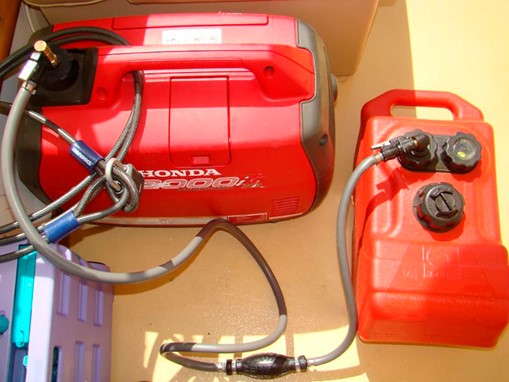
The main advantage of gasoline generators is their portability. They are compact, do not take up much space, so they fit in the trunk of a car: an excellent option for a fisherman with a small boat.
The gasoline generator copes well with repair work in marine conditions. The device is easy to operate and silent in operation, but is sensitive to the quality of fuel.
The power of a gasoline generator ranges from 2 to 20 watts. A gasoline generator is an excellent power source for a separate device.
As a rule, the generator's operating time on gasoline in the tank is about 4-5 hours, i.e. about how long you need to charge the batteries. And almost after each charge you need to fill up with gasoline, which is not very safe on a yacht. If charging the batteries with a generator at anchor does not cause problems, then when moving with a heel, a gasoline generator may simply not work, since it is not designed for such work.
A type of gasoline generator is an inverter device. Compared to the classic model, this type of gasoline generator consumes less fuel. The inverter model is characterized by stable operation and compactness, but they are much more expensive. You should pay attention to the inverter generator if you need a small power station to connect electrical devices with high sensitivity.


